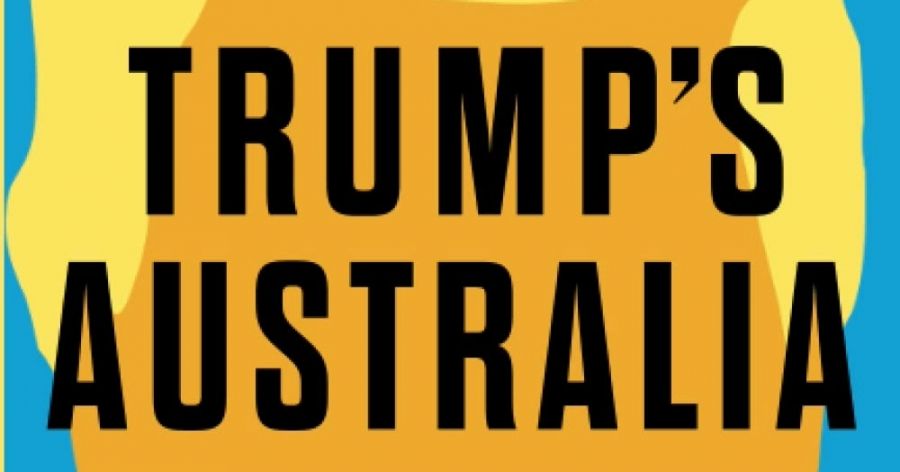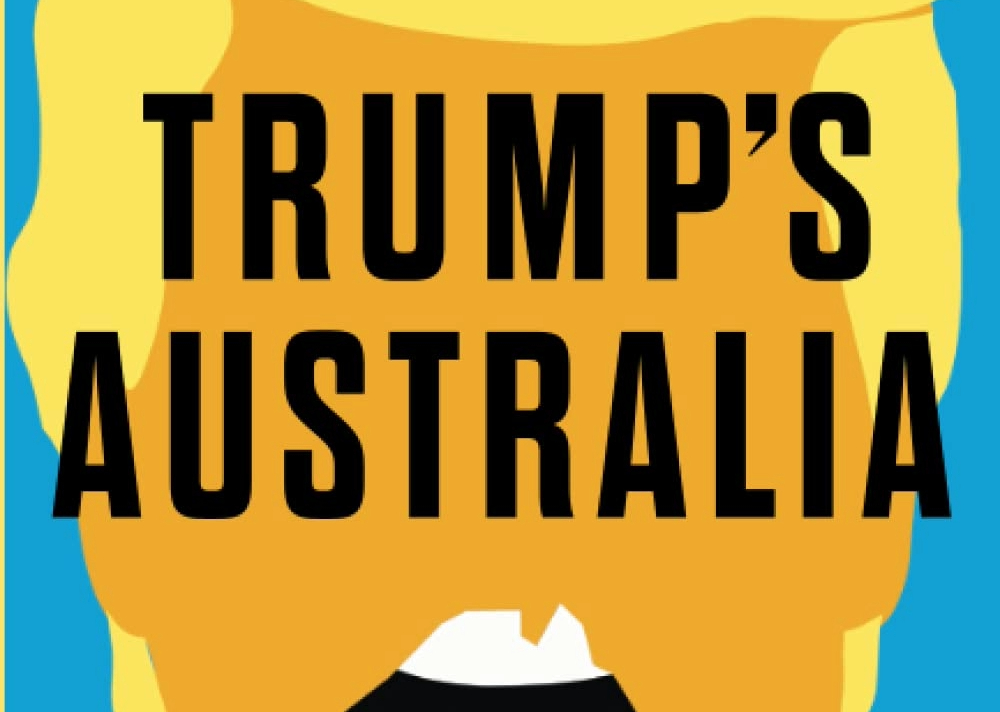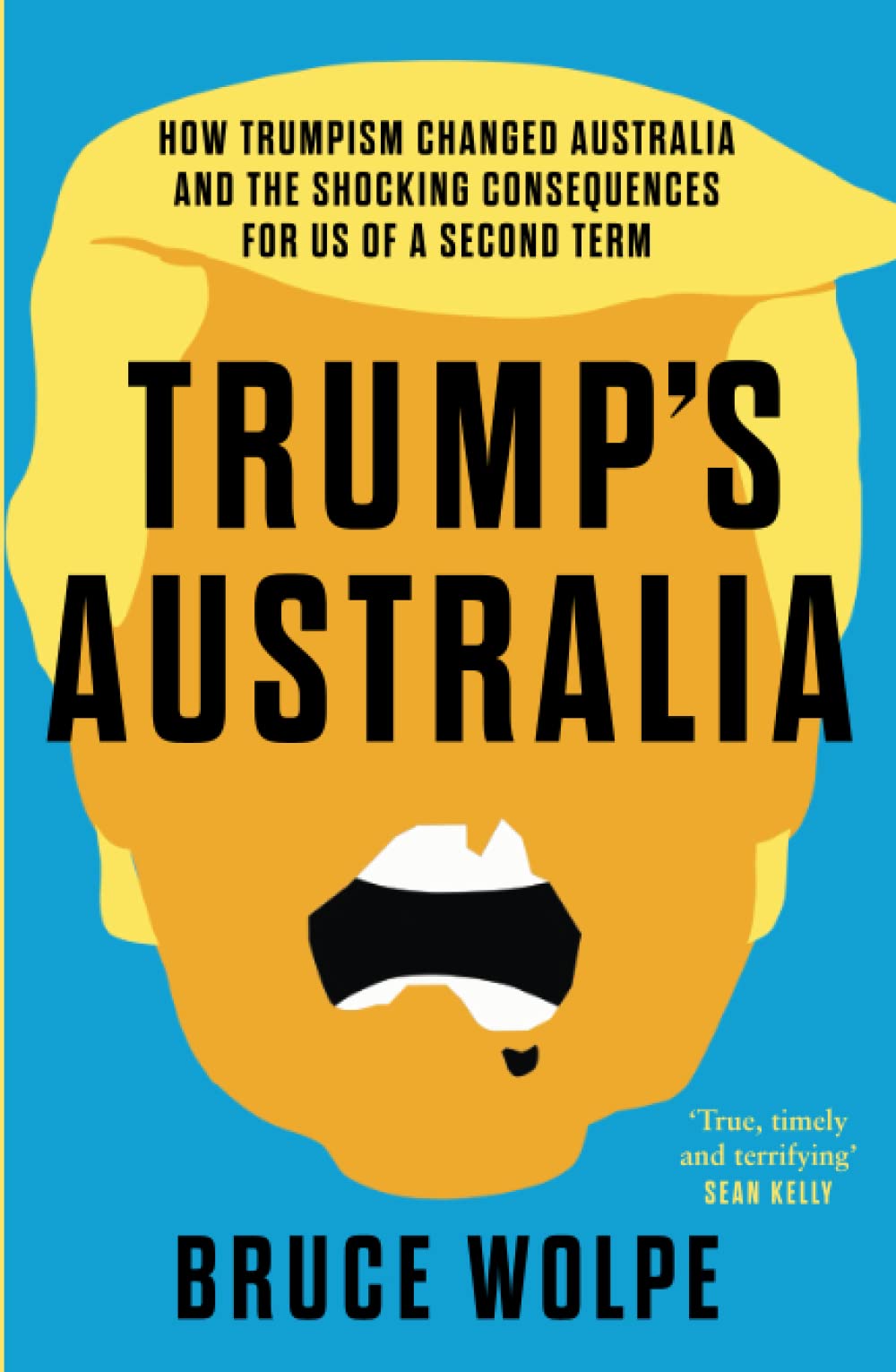
- Free Article: No
- Contents Category: Politics
- Review Article: Yes
- Article Title: The spectre
- Article Subtitle: Contemplating a second Trump presidency
- Online Only: No
- Custom Highlight Text:
Having worked for the Democrats in the United States and as chief of staff to Prime Minister Julia Gillard, Bruce Wolpe has credentials. Few in Australia are better placed to examine the implications for Australia, and particularly the Labor government, of a possible Trump return in 2024.
- Featured Image (400px * 250px):

- Alt Tag (Featured Image): Emma Shortis reviews 'Trump’s Australia: How Trumpism changed Australia and the shocking consequences for us of a second term' by Bruce Wolpe
- Book 1 Title: Trump's Australia
- Book 1 Subtitle: How Trumpism changed Australia and the shocking consequences for us of a second term
- Book 1 Biblio: Allen & Unwin, $34.99 pb, 311 pp
- Book 1 Cover Small (400 x 600):

- Book 1 Cover (800 x 1200):

For Wolpe and many others, reconciling this history with his imagined and aspirational version of America is deeply painful. In the prologue, Wolpe mourns the lost promise of the 1960s and particularly the Kennedys. Like the current president, Wolpe has never lost faith in that promise; he adheres to President Biden’s conviction that America’s ‘better angels’ will eventually prevail. Unlike some of the less critically reflective analyses of American politics we are often exposed to, though, Wolpe forces himself, and his readers, to confront the possibility that those ‘better angels’ might be a long way off, and that Australians, in particular, need to prepare for the possibility that they won’t win the next few battles in the war over America’s soul.
Divided into five sections, Trump’s Australia begins with a reflection on the Trump presidency (2017–21) through detailed examinations of Trump and Australian foreign policy, and then Trump and Australian domestic policy. The second half of the book, and the final three sections, turn to the future: to Trump and the future of democracy on both sides of the Pacific, examining and shoring up the guardrails that protect Australian democracy and, finally, what a second Trump administration might look like.
The first two sections, containing a wealth of detail on the Trump years, serve as important reminder of the completely unhinged nature of his administration. Though that detail will most likely be very familiar to readers with an interest in US politics, the way that detail is laid out sequentially is a valuable reminder of what exactly we are dealing with, while also showing that ‘there will be no effective guardrails on a second Trump presidency’.
One of the book’s most valuable contributions is its window onto thinking about the US alliance in Australia. Trump’s Australia is informed by Wolpe’s many interviews with former and current foreign policy officials, researchers and commentators (including this author), many of whom were granted the luxury of anonymity and thus spoke freely. Even small insights, like the anonymous assertion that ‘by the end of 2024, Australia needs to institutionalise the AUKUS ties to get ahead of a Trump presidency’, better explain the otherwise frustratingly opaque thinking behind the Albanese government’s approach to the alliance and its feeble attempts to justify the acquisition of nuclear-powered submarines as ‘progressive’, than anything said by officials or politicians publicly.
Perhaps the most refreshing aspect of the book is Wolpe’s reluctance to treat these questions of foreign policy as entirely separate from both Australian and American domestic politics and policy. The book’s unique contribution is that it directly connects the international – AUKUS, trade, and the state of the world more broadly – to the domestic, showing how, for example, efforts to undermine democracy in the state of Texas have direct implications for all of these questions, and how those efforts are, in turn, directly connected to far-right networks in a place like Victoria.
Wolpe does not limit his examination of the implications of a Trump redux to international affairs. Many readers will breathe a sigh of relief when they realise there is much more to this book than hand-wringing over what Trump might do with AUKUS. In sections on the economy and climate, Wolpe offers both warning and analysis. When he argues that ‘Trump’s utter hostility to climate change goals and programs has an echo-chamber effect in Australia’, Wolpe demonstrates all too clearly how the worst in our own domestic politics is so often reinforced by the US alliance, how Trump will only amplify that existing tendency, and how catastrophic that might be for the planet.
While much of the book is preoccupied with these questions, Wolpe’s critical engagement with the different answers he encountered in the interview process is at times uneven. This reader was hoping for more direct analysis of what the interviewees said and why they said it. To cite one example: an interviewee’s assertion that ‘Trump does not like war’ goes unremarked, when such a glib statement and the assumptions behind it could, presumably, dramatically influence how that particular (presumably influential) person might approach a second Trump term. One rejoinder to that statement might be that Trump is obsessed with violence and bloodshed. It is not that he doesn’t like war, it’s that he doesn’t like losing wars – and, more importantly, is convinced that he wouldn’t lose any. The difference seems important. In another example, an unnamed interviewee suggests that in the event of a second Trump presidency, the Australian government should ‘Cultivate Trump’s mates – get close to Trump’s people.’ Again, the sheer grossness of this idea, and the fact that it is, surely, antithetical to the premise of the entire book, might leave readers a little perplexed.
Who exactly the imagined reader is isn’t always clear. Primarily, the book is aimed at the same type of people on whose musings it is based. Trump’s Australia almost begs Australian officials and politicians to treat the questions raised by the book with the seriousness they deserve. At times, Wolpe seems torn between this audience and a more general readership that may not be across the differences between Australian and American political systems and democratic processes.
But it is that primary audience who would benefit most from this book and the existential questions it insists on asking. Trump’s Australia frequently notes the consensus among interviewees over the danger a second Trump administration would pose to both the United States and Australia. It offers clear, evidence-based suggestions for insulating Australia from those dangers now, before it is too late. Undoubtedly the most pressing and important of these is Wolpe’s reiteration of Aboriginal and Torres Strait Islander people’s calls for a Voice to Parliament. Wolpe rightly highlights Indigenous people’s clear understanding that the Voice and the outcome of the referendum are irrevocably connected to the role Australia plays in the world. The Voice would itself play a critically important role in countering the networks of organised white supremacy that cross the Pacific.
What Trump’s Australia cannot do is address one of the biggest problems it engages with: a foreign policy consensus so ingrained that officials will only speak honestly about Australia’s relationship with the United States when they can do so anonymously. Trump’s Australia implicitly suggests that if we are talking about preserving democracy, we should probably be talking a bit more about the secrecy and anti-democratic tendencies of foreign policy in this country, especially when it comes to the alliance. With Trump’s Australia, Bruce Wolpe makes a timely contribution to a growing push for a dramatic rethink of Australian foreign policy.


Comments powered by CComment